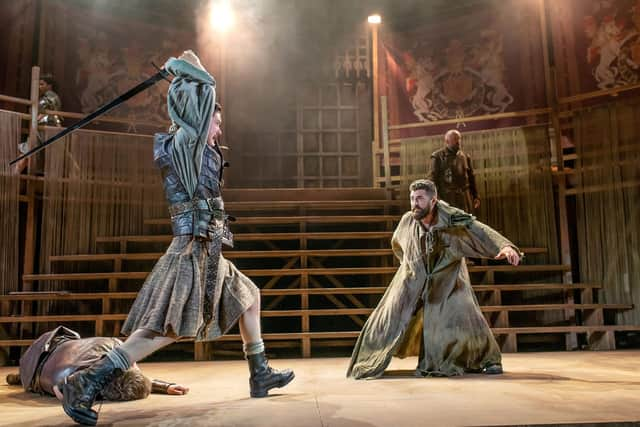Arts review of 2022: Joyce McMillan on the year in theatre
It began in a final Covid lockdown, and is ending in the coldest December Scotland has seen for years; but in between, 2022 emerged as a strange, almost feverish interlude of a theatre year, caught between the long months and years of pandemic closure, and a future so changed – not least by profound shifts in audience behaviour – that it seems some of our leading arts institutions may not make it to the end of 2023.
In the meantime, though, 2022 was a year of extraordinary riches on Scotland’s stages, fuelled both by the backwash of emergency pandemic funding, and by all the pent-up creative energy of the lockdown years. There was – to begin with – an astonishing avalanche of strong new plays, with more than 70 premiered during the year, 34 of them at A Play, A Pie And A Pint in Glasgow. In two brilliant seasons, Play, Pie And Pint artistic director Jemima Levick curated a programme that featured writers including Rob Drummond, Maryam Hamidi, Isla Cowan, Alice Clark, Johnny McKnight, Joe McCann and Ukrainian playwright Neda Nezhdana, among many others; and produced hit after hit on major current themes ranging from pandemic trauma, the immigration crisis and the horror of war, to rage against violence against women.
Advertisement
Hide AdAndy Arnold’s Tron Theatre also produced some thrilling new work in 2022, including 82 year-old John Byrne’s new musical Underwood Lane, and a stunning debut by young playwright, actor and director Eilidh Loan, with her acclaimed, tragic and hugely popular play Moorcroft, about an amateur football team in 1990s working-class Scotland. Pitlochry Festival Theatre opened its new studio in style, this autumn, with a season that included Martin McCormick’s The Maggie Wall, a heartbreaking monologue – beautifully delivered by Blythe Jandoo – about Scotland’s shameful history of persecution of so-called witches. It also featured the world premiere of May Sumbwanyambe’s mighty and intense chamber drama Enough Of Him – co-produced with the National Theatre of Scotland – about the legendary story of Joseph Knight, brought to 18th century Perthshire as an enslaved servant, and of his struggle for freedom.


In a strong year for new work from the National Theatre of Scotland, the company also staged Cora Bissett’s epic theatre version of Peter Mullan’s Glasgow film Orphans, and Uma Nada-Rajah’s wild all-female political farce Exodus. In the autumn, the NTS was associated with production company Raw Material, and Capital Theatres of Edinburgh, in staging James IV: Queen Of The Fight, Rona Munro’s rich and fascinating main stage play about the court of King James IV, the fourth part of her James Plays series. And the Lyceum Theatre’s first-ever Fringe programme, in August, produced two stunning new works, in Tim Crouch’s post-pandemic monologue Truth’s A Dog Must To Kennel, and the stage version of This Is Memorial Device, a unique fictional memoir of the 1980s Scottish indy music scene.
Raw Material, a powerful new force in Scottish-based theatre production, staged not only James IV, but also – with Eden Court Theatre, Inverness – the new Runrig musical The Stamping Ground, set to tour in 2023; and there was some glorious new work for children and young people, including Oliver Emanuel’s terrific I Am Tiger, beautifully directed by Perth Theatre’s outgoing artistic director Lu Kemp. I Am Tiger was performed by rising star Chloe-Ann Tylor, who also delivered an astonishing monologue performance in Eve Nicol’s Svengali, at the 2022 Edinburgh Fringe; and the Fringe also featured powerful new writing by Scottish-based playwrights James Ley, Isla Cowan, Alan Bissett and Vlad Butucea, among many others.
Nor, this year, was it all about brand new plays. The Glasgow Bard In The Botanics season returned in force, with a searing version of Medea directed by Gordon Barr, and starring brilliant bard actress Nicole Cooper. A few weeks later – in a year when female rage has been a major theatre theme – the National Theatre of Scotland delivered a thrilling Edinburgh International Festival staging of Liz Lochhead’s version of Medea, directed by Michael Boyd, and starring the mighty Glasgow-based writer and actress Adura Onashile.
In March, James McAvoy brought Jamie Lloyd’s terrific 2019 version of Cyrano De Bergerac to Glasgow, playing to packed houses, although he later revealed that the visit was marred by the shocking racism and sexism experienced by some black female company members in Glasgow; and Fergus Linehan’s final Edinburgh International Festival programme saw a remarkable theatre programme of a dozen shows, including thrilling productions from the Netherlands of Ivo van Hove’s A Little Life, and Eline Arbo’s version of Edouard Louis’s The End Of Eddy.


It was a memorable year, in other words, for those lucky or privileged enough to experience it; but in truth, it raised profound questions about whether we will ever see its like again. Over the last 50 years, theatre in Scotland has been what one international scholar called “a theatre that matters”, in its ability not only to speak to the big questions facing the nation, but to do so in a way that often made itself accessible to a popular audience, and significant to the nation’s wider cultural and public life.
Advertisement
Hide AdHow, though, can it continue to matter now, in an age of soaring ticket prices, and of unprecedented pressure both on public finances, and on our personal spending power? To say that new thinking, new energy, and new creativity is needed, to create affordable and accessible cultural richness in these bleak times, is to state the obvious; and unless governments and other funders, arts companies and artists themselves, all come together to seek those new ways forward, what has been something of a postwar golden age for Scottish theatre and culture could be moving inexorably towards its end – and that despite the spectacular display of brilliant and committed talent we have seen, on Scotland’s stages this year.